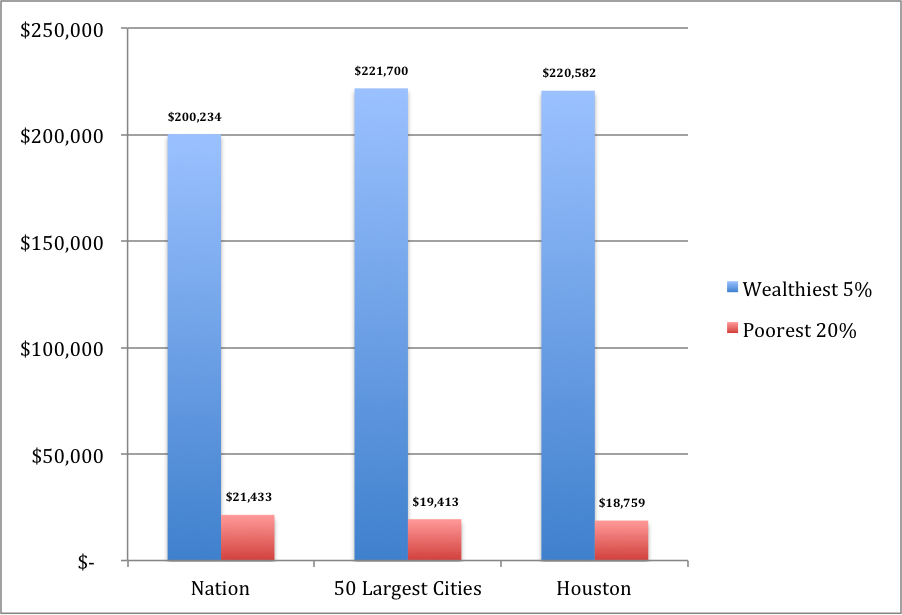So there’s good news and bad news about income inequality in Houston.
According to a new report released by the Brookings Institution Metropolitan Policy Program today, Houston is one of only two major American cities where the average income of both the city’s wealthiest (top 5%) and poorest (bottom 20%) residents increased. (The other city was Jacksonville.)
By contrast, most other urban areas either saw the incomes of the rich rise without a similar increase in the income of the poor, as was the case in San Francisco, New York, and Dallas. Some saw increases in the incomes of the poorest, but smaller or no gains among the top 5% as happened in Austin, Kansas City, and Milwaukee.
As an update to last year’s Brookings study of incomes between 2007-2012, the new numbers give some credence to the oft-touted idea that Houston is one of the most opportunity-filled cities in America.
Even so, however, Houston remains among the most unequal cities in the nation.
As the accompanying chart shows, Houston’s richest residents make 11.8 times the average income of the poorest residents ($220,582 to $18,759). That’s slightly above the national average for the country’s 50 largest cities (11.6 times) and significantly above the nation as a whole (9.6 times).
Average Income of Wealthiest 5% and Poorest 20% in 2013
Data from the Brookings Institute
By this measure Houston was the 15th most unequal city in the nation in 2013. While this is technically an improvement over 2012 (when it ranked 11th), the gap between rich and poor remained pretty much the same. So the city’s improvement in the rankings had mostly to do with four other cities becoming more unequal – Detroit, Cleveland, Minneapolis, and Dallas – and little to do with Houston making improvements on income inequality on its own.
Brookings has encouraged metro areas to take innovative actions that can better the economic lot of all their citizens and shrink the income inequality in a durable way, including increasing the minimum age, making greater investments in job upskilling, better education at all levels, and other social support systems that could increase the income and life chances of the city’s poor.
Houston has already taken some of these steps. The city is improving its mass transit system, a small but significant step in easing the cost of transportation for the city’s poorest. The Greater Houston Partnership is pursuing a metro-wide push for early education and is working in concert with the city’s energy industries and community colleges to help train thousands of workers for high-paying blue-collar jobs. These programs represent the type of long-term educational and employment investments that could play a meaningful role in shrinking the city’s income inequality.
By contrast, attempts to address income inequality by other means face considerable obstacles in the city. Minimum wage discussions are unlikely to gain momentum in Texas, a right-to-work state. Educational attainment remains low among black and Latino youth in the city. These two groups represent 70% of Houstonians under the age of twenty and their under-preparedness for the job market presents a huge problem to the city’s immediate future. Further, Houston and Texas as a whole have traditionally been unwilling to implement other social programs such as public housing or health care at levels that might make a dent in the city’s income inequality.

